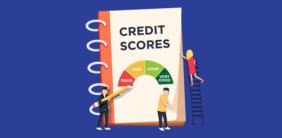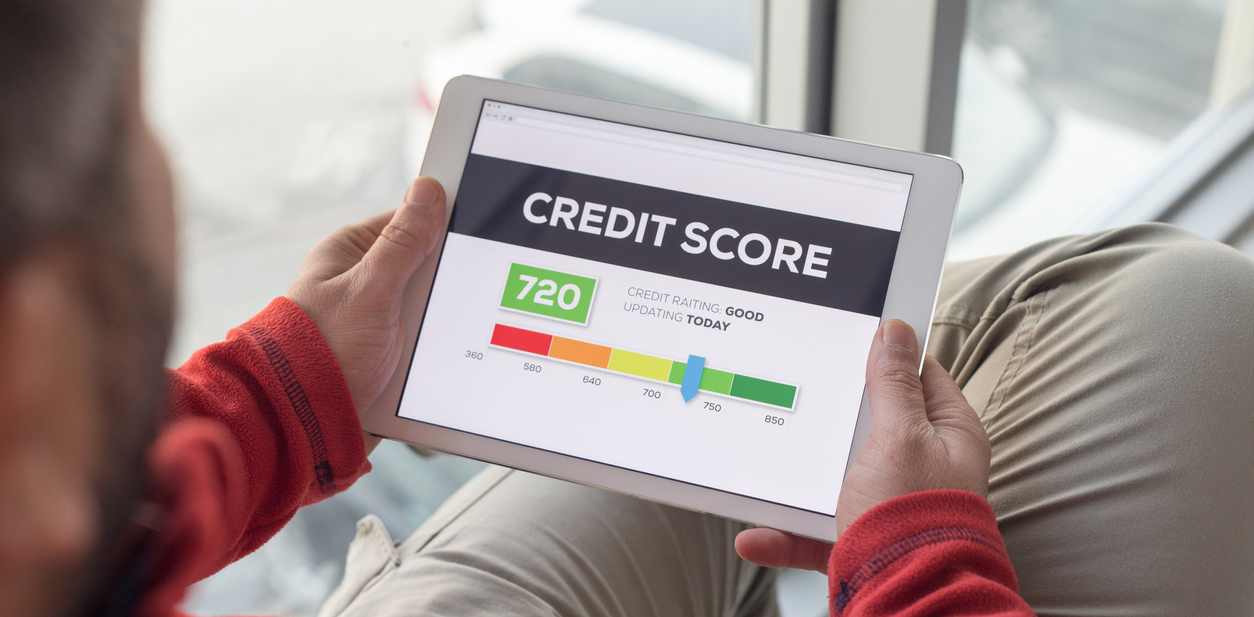Get better loan offers and terms by boosting your credit score.
You’ve done it: you’ve found the perfect car for you at a great price point, filled out a loan application, and waited with bated breath… only for your application to be denied.
Rejected loan applications or less-than-ideal terms often serve as an indicator of a low credit score. Low credit scores can bring a new car purchase or refinance to a screeching halt and throw a wrench into your financial planning.
Fortunately, low credit scores aren’t insurmountable obstacles in your credit journey; they’re minor hurdles that can, in time and with enough effort, be overcome until they’re nothing more than a speck in your rear-view mirror.
Before taking out a new car loan, spend some time considering the strength of your credit score. Are you happy with where you stand? If not, put your loan application off for just a little and try some of the seven ways to improve your credit score — you (and your bank account) will be glad you did!
What Your Credit Score Means
Your credit score is a three-digit number that typically ranges between 300 and 850. Higher scores indicate stronger creditworthiness and less risk posed to lenders, resulting in better loan offers and terms. Lower credit scores indicate some issues with your credit or a credit history that’s too short to accurately determine the risk you pose to lenders.
Financial institutions, including the three major credit bureaus (Equifax, Experian, and TransUnion), use your credit history and report to calculate your credit score. Your score is then used by lenders, banks, and other financial entities to determine if they should lend you money, as well as the terms of any loan offer they extend to you.
Credit score models can fluctuate depending on the institution calculating or providing your credit score. You’re likely familiar with FICO scores, which are used by over 90% of lenders. You may also have heard of VantageScore, another type of credit scoring model. Many institutions will also use their own proprietary models to determine your credit score based on the factors they consider most important.
Credit score classifications
Ranges of credit scores are often broken down into certain classifications, depending on how low or high the credit score is. For example, FICO scores are classified as:
| FICO Credit Score Range |
Rating |
Description |
| Below 580 |
Poor |
Substantially below the average credit score; may pose a risk to lenders |
| 580-669 |
Fair |
Below-average; may still be offered loans |
| 670-739 |
Good |
Near or above the average credit score; good chance of being approved for a loan or credit |
| 740-799 |
Very good |
Above-average; trustworthy borrower |
| 800+ |
Exceptional |
Substantially above the average credit score; very little risk to lenders |
VantageScore credit scores are
graded similarly, with scores of 300 classified as “deficient” and scores nearer to 850 considered “excellent.”
Credit reporting agencies may also grade credit scores from lowest to highest, such as:
| VantageScore Credit Score Range |
Category |
| 300-500 |
Deep subprime |
| 501-600 |
Subprime |
| 601-660 |
Nonprime |
| 661-780 |
Prime |
| 781-850 |
Super prime |
In such cases, the more “prime” your credit score, the better your likelihood of receiving a loan offer and favorable terms.
Factors that affect your credit score
The factors included in and measured on your credit report are weighed together to determine your credit score, though models and lenders may weigh each factor differently. In general, the stronger your credit history, the higher your credit score.
A solid credit history includes:
- Frequent and on-time payments,
- Low credit utilization,
- Ample credit history,
- A diverse mix of credit (such as auto loans, student loans, a mortgage, and revolving credit, such as credit cards), and
- Few hard credit inquiries (which indicate you apply for credit often).
As can be expected, poor credit history can lower your credit score. Negative factors include:
- Multiple missed or late payments,
- High credit utilization (high balances vs. low available credit),
- Too few accounts reported,
- Too many new accounts opened,
- Public records, such as bankruptcies, liens, or foreclosures, and
- Frequent credit inquiries.
A strong credit history with little to no negative factors will result in a high credit score. Overspending or stretching your finances too thin can lead to bad credit practices and, as a result, a low credit score.
Take Steps to Boost Your Credit Score
Your credit score fluctuates depending on the information reported to credit bureaus and compiled on your credit report. In general, you can expect your credit report and score to update about every 30 to 45 days.
With a little effort and some careful planning, you can use the time between updates to improve the factors that influence your credit score. By practicing good credit-building behaviors, your credit score can steadily rise, bringing with it a higher likelihood of getting approved for a loan, lower interest rates, and better payment terms.
1. Make On-Time Payments
Your payment history constitutes 35% of your credit score, making it the single most significant factor behind whether or not you’ve got a high score. In other words, if you’re not paying your bills on time, lenders might not loan you a dime.
Solid payment history shows lenders that you’re responsible with your money and likely to pay back any money you borrow. Since loans are paid back over an agreed-upon term, lenders also want to see that you’re consistent in paying them back on time.
Ensure you don’t miss a payment by setting up automatic payments, either by having the lender withdraw your payments from your bank account each month or by setting up bill pay with your bank or credit union.
2. Reduce Your Credit Utilization
Credit utilization is the percentage of credit that you’re using vs. your total available credit. For example, if you have a combined credit limit of $10,000 across your various credit cards and have an existing balance of $2,500, your credit utilization rate would be 25%.
Credit utilization influences 30% of your credit score, making it the second-most important factor to focus on. (It may also impact your debt-to-income ratio.) Fortunately, it’s not all too difficult a factor to improve upon.
The trick behind lowering your credit utilization — and improving your credit score — is to simply use less of your available credit. According to Experian, the sweet spot to aim for is to use 30% or less of your total credit.
That doesn’t mean you can’t use your credit as needed, of course. What it does mean, however, is that you should do your best to ensure you don’t carry large credit balances from month-to-month. Tailor your payments so that you maintain less than 30% utilization — or, ideally, less than 10% — of your total available credit.
Credit utilization on an individual credit card may also affect your credit score. To help improve your score and decrease utilization, pay down cards with larger balances and utilization percentages first.
Not only will decreasing credit utilization result in fewer interest fees, but your credit score is likely to improve, too.
2.5 Raise Your Credit Limit
You may further reduce your credit utilization by increasing your credit limit. Using $3,500 out of $10,000 of available credit equates to a credit utilization rate of 35%. However, $3,500 out of $12,000 of available credit brings your credit utilization to 29.17% — or just below the sweet spot of 30%.
Bear in mind that it’s not wise to raise your credit limit if you’re likely (or more likely) to increase your credit card balance. Raising your credit limit isn’t an excuse to spend more; its purpose is to raise the ceiling used when calculating your credit utilization rate. The higher the ceiling, the lower your utilization, provided your balance remains the same (or is paid down).
3. Check and Correct Your Credit Report
Your credit report is a detailed break-down of your credit history. Each factor measured and tracked on your credit report is used by credit bureaus and lending institutions to score your overall creditworthiness, so it’s important that the information on your report is correct.
If it’s not, you might end up with a lower credit score than you should have, leading to less favorable loan terms or outright credit rejections.
Fortunately, it’s pretty easy to check your credit report. The Fair Credit Reporting Act, or FCRA, requires credit bureaus to give you free annual access to your credit report. Reviewing your free credit report will give you both a deeper understanding of your overall creditworthiness, as well as the opportunity to fix any errors and dispute anything that seems incorrect or fraudulent.
Under the FCRA, credit bureaus must verify, fix, and remove any incorrect or false information found on your credit report. Improving the accuracy of your report should result in a boost to your credit score.
4. Limit Hard Credit Checks
Credit inquiries are made whenever an entity, such as a bank, car dealership, or even yourself, requests a copy of your credit report.
Soft inquiries, or soft credit checks, occur when someone is looking at your credit report for reasons other than you opening a new account or line of credit. They may happen when you apply for a job or are being pre-approved for a credit offer.
Hard inquiries, or hard credit checks, happen when you’re applying for credit or a loan. Unlike soft inquiries, hard credit checks impact your credit score by an average of five to 10 points, according to Experian. Fortunately, the drop to your credit score is temporary and likely to fade away within months (though may remain on your credit report for up to two years).
Unlike soft inquiries, hard credit checks impact your credit score by an average of 5 to 10 points.
Though infrequent hard inquiries present little cause to worry, frequent and excessive hard checks can cause a more significant negative impact to your credit score. Too many loan or credit applications within a short timeframe can cause lenders to assume you’ve run into financial issues, can’t get approved for credit from other lenders, or are desperate to borrow.
If you’re a savvy rate-shopper, however, you have nothing to fear. Multiple credit inquiries made for the same purpose — such as buying a car or refinancing an auto loan — are often treated as a single inquiry if they occur within a given timeframe (generally anywhere from 14 to 45 days).
5. Keep Accounts Open
Your credit history makes up 15% of your credit score, so don’t go closing and throwing away your old and paid-off credit cards.
Lenders appreciate seeing a long and positive credit history, even if you’re not actively using the account anymore. Having a few open and unused accounts can even increase your available credit and reduce your credit utilization.
Similarly, a long history of making your loan payments on-time tells lenders you’re dependable, reliable, and can handle your finances well, boosting your credit score and the likelihood you’ll be offered credit when you ask.
6. Have a Diverse Mix of Accounts
In addition to the length of your credit history, lenders also want to see a diverse mix of accounts. Though credit mix constitutes 10% of your credit score, it isn’t the biggest factor, but it can help beef up your score if you’re still relatively new to building credit — and it’s pretty easy to attain.
Your credit mix should contain both revolving accounts — like credit cards — and installment accounts, such as car or student loans. You shouldn’t open an account only to throw a bit of diversity into the mix, but lenders appreciate seeing a responsible payment history across a variety of accounts (so long as you can comfortably manage them — and have a reason for opening them).
Revolving account: an account with a set credit limit, such as a credit card or line of credit. Balances carried month to month incur interest and other fees.
Installment account: a debt with a fixed payment plan for a period of time, such as a mortgage or auto loan. .
7. Become an Authorized User
If you’re just starting out at building your credit or need help boosting your credit score, ask a family member or significant other if you can be added to one of their credit cards as an authorized user.
When you become an authorized user, you inherit the credit history of the account holder. This means your credit report will eventually show the primary account holder’s credit history, strength, and utilization. If they’re responsible with their credit, you’ll “piggyback” on their history, effectively raising your own credit score (provided you’re responsible, too).
A Credit Sesame survey reports that those with bad (sub-550) credit scores increased their credit scores by up to 10% in the first 30 days of being added as an authorized user. Over the course of a year, those same individuals saw improvements of up to 30%.
Why Should You Improve Your Credit Score?
Having a good credit score makes it easier to qualify for loans and lines of credit, but if you’re not having issues doing so already, what’re the benefits of increasing your credit score?
One of the most important reasons to boost your credit score is to save on interest charges. When you apply for and take out a loan, you’re responsible for paying back both the loan principal (the money you borrowed and agreed to pay back) and the interest (money paid on top of the principal in exchange for borrowing it).
Since your credit score is a rating of your overall creditworthiness and the risk (or lack thereof) that you pose to the lender, a higher credit score equates to a lower interest rate and APR. This means you’ll pay less money in interest on a new car purchase or can refinance a car loan to have a lower interest rate.
It also means receiving loan offers with more favorable terms and higher dollar limits, lower car insurance rates, and access to more and better financial products.
How Much Should I Expect My Credit Score to Improve?
Lower credit scores are significantly easier to improve on than one that’s already above-average, according to Experian. Consumers with low credit scores can reasonably achieve improvement by upwards of 100 points because they have more factors to improve than those who already have good credit.
Still, just because you have a good credit score doesn’t mean you can put your feet up on the dash and relax. There are no downsides to improving your credit score, and a 15-point increase from 730 to 745 puts you into a whole new bracket.
How Can I Improve My Credit Score Quickly?
The time it takes to improve your credit score depends on your unique financial situation. In general, practicing good credit habits can result in visible improvements to your credit score within six months.
Your mileage may vary, however. Substantial dings to your credit, like bankruptcies and loan defaults, take much longer to recover from compared to high credit utilization. Still, as long as you’re making positive improvements to your situation, your credit score will eventually follow suit.
Other Resources to Improve Your Credit
If you’re struggling to improve your credit, or simply need some guided advice, help is available in the form of credit counseling from organizations like the National Foundation for Credit Counseling, or NFCC.
The NFCC and other credit counseling agencies help you formulate a plan and budget to tackle your debt and overcome the negative information weighing down your credit score.
Other services, like UltraFICO and Experian Boost, link to your bank accounts and transaction histories to add positive actions (like on-time bill payments) to your credit report. Since activities like utility payments aren’t usually reported on credit reports, UltraFICO and Experian Boost can be especially useful for those with thin credit histories who need a little “padding” to get started.
Similarly, you can also sign up for a credit building service, like eCredable Lift which reports your utility and phone bill payments to TransUnion, or Self which offers credit builder (aka secure) loans to help you establish a credit history.
Boost Your Credit Score and Qualify for More
Increasing your credit score isn’t effortless, but the payoff is well-worth the work. As your score rises, so, too, will you start to qualify for lending opportunities previously unavailable to you, at rates and terms that keep more of your money in your pocket.
And the kicker? Once you’ve implemented good credit habits to improve your credit score, it’s easy to sustain as long as you stay focused, on-point, and responsible.
;)












